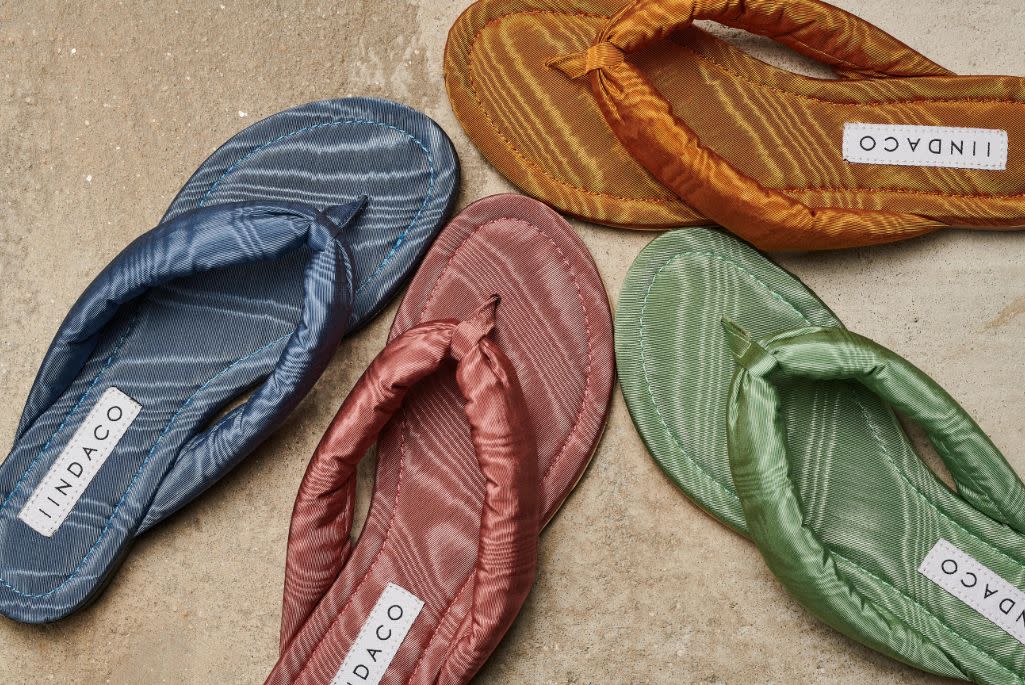How This Upcycled Capsule Is Helping Keep 3 Small Italian Factories in Business

Click here to read the full article.
Launching a shoe label during a global pandemic is no easy feat. However, Iindaco founders Pamela Costantini and Domitilla Rapisardi haven’t stopped there.
Today, they are unveiling a limited-edition sustainable capsule of upcycled sandals that is helping keep three small Italian factories from going out of business.
More from Footwear News
Jennifer Garner's Pride Look Includes Mom Jeans & Gucci Sneakers
Amazon Launches $2 Billion Fund to Invest in Sustainable Companies -- How Businesses Can Qualify
The quilted thongs dropping today on the brand’s e-commerce site are made of both deadstock and offcuts upcycled from Iindaco’s main collection. Available in five colorways of satin moray fabric, they retail at around $125 on Iindaco.com.
Following Italy’s deconfinement, the duo were on the hunt for future collaborators and suppliers of sustainable materials in Tuscany and visited Sepam Shoes, a small family run factory near Arezzo that employs 20 people.
The owner, Francesco Rimbotti, was terrified the he would have to close his business due to cancellations of orders resulting from the pandemic and money already spent on materials that he could not hope to recoup.
As a small, predominantly direct-to-consumer start-up, Iindaco has been able to successfully ride out the pandemic but the duo swiftly realized the extent of the problems faced by the area’s factories and suppliers.
“We discovered that that they’ve been struggling even more than us,” said Rapisardi. “We knew we had to find a way to help them.”
They made a decision on the spot to buy up his entire stock of 300 soles.
“It was a spur of the moment emotional decision. We didn’t even think twice about it,” said Costantini. “We just looked at each other and said, ‘We’ll buy it.’”
With small local factories, shoe making is an intensely collaborative process. Sepam works with a network of other small specialist ateliers, each of which is responsible for different elements of a shoe from assembling the uppers to stitching the brand tags onto the insoles. He enlisted two of these for the task in hand.
“The makers of the uppers and the labels had already closed down,” said Rapisardi, “so they were able to open again to work on the project. It was such a good feeling.”
The project involving the three small businesses came together in six weeks flat. “It was such a rush,” she added, “because they needed help now not in six months time.”
Rimbotti told FN that his factory has lost 60% of its business due to the pandemic and while the Iindaco capsule has thrown him a lifeline, he is certainly not out of the woods yet. “We are still not certain about the viability of our business going forward,” he said. “Although we have been able to reopen our offices and modeling department, our assembly line workers are still laid off.”
With companies increasingly outsourcing production to countries where labor is cheaper, the smaller players in the Italian footwear industry have been struggling for some time, he said. “We were already in pain even before the pandemic but now you can imagine just how difficult it is.”
His only hope is that the pandemic will amplify the plight of businesses such as his. “We believe it is very important to bring the work back to Italy and to 100% protect the product that is truly manufactured here,” he concluded. “Only this can change the fate of such small and medium sized enterprises.”
A number of larger brands are also emphasizing Italian craftsmanship. Gucci for instance, together with Italian bank Intesa Sanpaolo, launched its own supply chain development program in 2015. It has recently expanded the partnership and is acting as a guarantor to small and medium-sized companies in its supply chain so they can procure easier access to loans with favorable rates of interest.
Dolce&Gabbana is spotlighting Florentine craftsmanship and the Made in Italy tradition via the Alta Sartoria and Alta Moda fashion shows it will host in September, in partnership with with Pitti Imagine (organizers of the postponed Pitti Uomo trade fair) and the City of Florence. In addition to their invited physical audience, the shows will also be livestreamed globally.
For their part, Costantini and Rapisardi hope that if this initial capsule sells well on their e-commerce, they can roll it out to the wholesale market too.
Use of sustainable materials and a responsible production process has been part of Iindaco DNA from the outset. Likewise, the seasonless aspect of the brand. Their strategy is to augment their core collection with small drops in limited quantities — both according to what the customer needs and the availability of dead stock resources.
Their concept proved prescient. The pandemic has highlighted industry and public concerns about the unsustainable pace of the retail calendar and placed a spotlight on responsibility and local production.
It has also created demand for keenly priced, artisan crafted footwear with high sustainability credentials. Ancient Greek Sandals, itself launched during the financial crisis of 2008, has recently unveiled a similar upcycled, entry price capsule for pre-spring ’21 which has garnered considerable buyer attention.
Ancient Greek Sandals’ capsule too was conceived to further support the local Greek factory that produces the brand’s regular collections. The sales campaign began last month, and according to global sales director Yiannis Vagenas, has received a really positive response from buyers including Shopbop, Level Shoes and Le Bon Marché.
Iindaco opened their Paris showroom for sales appointments in January and launched e-commerce the following month. While a strong direct to consumer focus was always the plan, they have also just dropped selected styles with Italian department store Luisa Via Roma and hope to expand their retail partnerships as the brand grows.
Sign up for FN's Newsletter. For the latest news, follow us on Facebook, Twitter, and Instagram.

